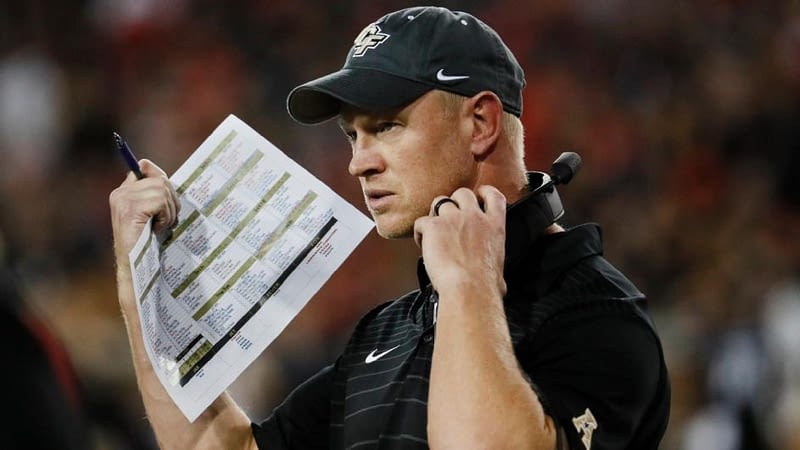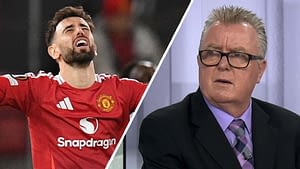Scott Frost’s Return to UCF: A New Chapter in a Familiar Setting
ORLANDO, Fla. — Scott Frost is back at the University of Central Florida, stepping into a role that feels both familiar and new. As he walks into the UCF football building, he finds himself in the same office he occupied eight years ago. The shades are drawn, just as they were back then, and the walls are adorned with drawings from his three children. Trophies still sit proudly on a shelf, a testament to past achievements.
Despite the familiar surroundings, Frost is not the same man who left UCF after an undefeated 2017 season to take on the head coaching job at Nebraska. The university itself has evolved, now part of a Power 4 conference with a 12-team College Football Playoff that offers a legitimate path to national championships, unlike the self-declared title of the past. Construction is underway to upgrade the football stadium, signaling growth and ambition.
“I know I’m a wiser person and smarter football coach,” Frost shared in an interview with ESPN. “When you’re young, you think you have it all figured out. I don’t think you really get better as a person unless you go through really good things, and really bad things. I just know I’m where I’m supposed to be.”
On the practice field, Frost feels at home, returning to the place that has shaped much of his life. His coaching style remains straightforward, a quality that quarterbacks coach McKenzie Milton remembers fondly from their previous time together at UCF. Milton, who started at quarterback on the 2017 undefeated team, has maintained a close relationship with Frost.
“I see the same version of him from when I was here as a player,” Milton said. “Even though the dynamic in college football has changed dramatically with the portal and NIL, I think Coach Frost is one of the few coaches that can still bring a group of guys together and turn them into a team, just with who he is and what he’s done and what he’s been through in his life. He knows what it looks like to succeed, both as a coach and a player.”
Frost acknowledges the changes in college football but embraces the challenge. “I love coming into work every day. We’ve got the right kids who love football. We’re working them hard. They want to be pushed. They want to be challenged. We get to practice with palm trees and sunshine, and we’re playing big-time football. But it’s also just not the constant stress meat grinder of some other places.”
When asked if he was referring to Nebraska, Frost replied, “You can think what you want. One thing I told myself — I’m never going to talk about that. It just doesn’t feel good to talk about. I’ll get asked 100 questions. This is about UCF. I just don’t have anything to say.”
Frost has no regrets about leaving UCF, despite the lack of success at Nebraska. When Nebraska parted ways with coach Mike Riley in 2017, Frost was the obvious choice to replace him, having been the starting quarterback on the 1997 team, the last Nebraska team to win a national title. His coaching résumé was impressive, having taken UCF from a winless season to an undefeated one in just two years.
However, the allure of Nebraska and power conference football was too strong to resist. “I was so happy here,” Frost said. “We went undefeated and didn’t get a chance to win a championship, at least on the field. You are always striving to reach higher goals. I had always told myself I wasn’t going to leave here unless there was a place that you can legitimately go and win a national championship. It was a tough decision because I didn’t want to leave regardless of which place it was.”
Frost admits that returning to Nebraska was partly to please others. “I think I kind of knew that wasn’t best for me,” he said. “It was what some other people wanted me to do to some degree.”
In his time with the Cornhuskers, Frost went 16-31, including 5-22 in one-score games, and was fired three games into the 2022 season after a home loss to Georgia Southern. After his dismissal, Frost moved to Scottsdale, Arizona, where he reflected on his career and future. He stayed connected to the game, coaching in the U.S. Army Bowl, a high school all-star game, in December 2022. Milton, who coached alongside him, recalls a conversation where Frost expressed his desire to return to UCF.
“He said, ‘It’s my goal to get back to UCF one day,'” Milton said. “At that time, I was like, ‘I pray to God that happens.'”
Frost’s journey back to UCF involved a stint in the NFL with the Rams, where he worked as a senior analyst. Rams coach Sean McVay valued Frost’s leadership and experience, noting his ability to communicate effectively with players.
“It was more just getting another great leader in the building, someone who has been a head coach, that has wisdom and a wealth of experience to be able to learn from,” McVay told ESPN. “His ability to be able to communicate to our players from a great coaching perspective, but also have the empathy and the understanding from when he played — all of those things were really valuable.”
McVay and Frost had discussions about handling the challenges of falling short as a head coach. “There’s strength in the vulnerability,” McVay said. “I felt that from him. There’s a real power in the perspective that you have from those different experiences. If you can really look at some of the things that maybe didn’t go down the way you wanted to within the framework of your role and responsibility, real growth can occur. I saw that in him.”
Frost’s time with the Rams rejuvenated him. “It brought me back,” Frost said. “Sometimes when you’re a head coach or maybe even a coordinator, you forget how fun it is to be around the game when it’s not all on you all the time. What I did was a very small part, and we certainly weren’t going to win or lose based on every move that I made, and I didn’t have to wear the losses and struggle for the victories like you do when you’re a head coach. I’m so grateful to those guys.”
UCF athletics director Terry Mohajir received a call from then-head coach Gus Malzahn last November. Malzahn was considering becoming offensive coordinator at Florida State, and Mohajir began preparing a list of candidates. When Malzahn decided to step down, Mohajir reached out to Frost, who was interested in returning as head coach.
Mohajir consulted with McVay and Rams general manager Les Snead, who praised Frost’s work ethic. “They said, ‘You would never know he was the head coach at a major college program.'” Mohajir also spoke with former Nebraska athletic director Trev Alberts to understand what happened with the Cornhuskers.
“Fits are a huge piece, and not everybody fits,” Mohajir said.
After eight conversations, Mohajir met Frost in person at an airport hotel in Dallas. “He was motivated,” Mohajir said. “We went from coast to coast, talked to coordinators, head coaches, pro guys, all kinds of different folks. And at the end of the day, I really believe that Scott wanted the job the most.”
Frost’s first day back in Orlando was a whirlwind. He arrived in Florida for his introductory news conference with his family, feeling a mix of excitement and nostalgia. “Rather than bouncing around chasing NFL jobs, we thought maybe we would be able to plant some roots here and have our kids be in a stable place for a while at a place that I really enjoyed coaching and that I think it has a chance to evolve into a place that could win a lot of football games,” Frost said. “All that together was just enough to get me to come back.”
The question now is whether Frost can replicate his previous success at UCF. The 2017 season remains the only winning season of his head coaching career, but it holds significant weight for UCF fans. After finishing 13-0, UCF self-declared as national champions, sparking a conversation about the inclusion of schools outside power conferences.
UCF’s move to a Power 4 conference and the expansion of the College Football Playoff to 12 teams provide a clearer path to a national title. However, Frost cautions against expecting a repeat of 2017. “I don’t think there’s many people out there that silly,” Frost said. “People joke about that with me, that they’re going to expect you go into undefeated in the first year. I think the fans are a little more realistic than that.”
The landscape of college football has changed, with the transfer portal and NIL impacting team dynamics. UCF’s financial situation in the Big 12 also presents challenges, but Frost remains optimistic. “It’s like we moved to the fancy neighborhood, and we got a job that’s going to pay us money over time, and we’re going to do well over time, but we’re stretching a little to be there right now, and that requires a lot of effort from a lot of people and a lot of commitment from a lot of people,” Frost said. “So far, the help that we’ve gotten has been impressive.”
Mohajir emphasizes the importance of consistency at head coach, hoping that Frost’s long-term commitment will benefit the program. “Based on what I’m seeing right now, it will absolutely work,” Mohajir said. “But I don’t really look at it as ‘working again.’ It’s not ‘again.’ It’s, ‘Will it work?’ Because it’s a different era.”
Frost’s vision for success is not about recreating 2017 but about building a competitive team in the Big 12. “If our group now can help us become competitive in the Big 12, and then, from time to time, compete for championships and make us more relevant nationally, I think we’ll have done our job to help catapult UCF again,” Frost said.
In essence, Frost is seeking the same outcome but is prepared to take a different path to get there.
Originally Written by: Andrea Adelson





















